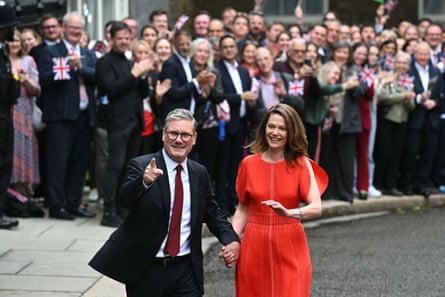In a stiflingly hot room at a health centre in East London, as he announced the government’s 10-year plan for the NHS on Thursday, Keir Starmer was confronted with a brutal assessment of his first year in power.
“You’ve U-turned on your reforms, your MPs don’t trust you, and markets worry that you’ve lost resolve on fiscal discipline. It’s the epitome, isn’t it, of sticking-plaster politics and chaos that you promised voters you would end?” a television journalist asked.
Initially, Starmer avoided answering the question, but he eventually addressed the fall-out from his government’s chaotic handling of its welfare bill. “I’m not going to pretend the last few days have been easy: they’ve been tough,” he admitted.
“I’m the sort of person that then wants to reflect on that, to ask myself what do we need to do to ensure we don’t get into a situation like that again, and we will go through that process. But I also know … that we will come through it stronger.”
The jubilant crowds of flag-waving supporters that greeted the prime minister as he arrived in Downing Street on 5 July 2024, daring to hope for a brighter future after 14 long years under the Conservative party, felt like a very long time ago.
Senior members of Starmer’s inner circle now quite openly admit that their first year in power has not gone as expected. “I always knew it would be hard, but I think I was probably quite naive about just how hard it would be,” one said.
“We had a difficult fiscal inheritance and there was this sense in the country that everything was broken. We promised change but people aren’t feeling it yet. And they’re not in any mood to give us the benefit of the doubt,” a cabinet minister added.

Despite all the political misjudgements such as early gloominess over the economy when the country needed to feel hope, unforced errors over issues such as the winter fuel cuts and freebies and a party base unsettled over cuts to international aid and the welfare system, it is too simplistic to suggest that it has all been bad.
Decisions to raise the national minimum wage, improve workers’ rights, build more affordable housing and cut NHS waiting lists have all been popular. Even more starkly “Labour” policies such as nationalising the railways, introducing VAT on private schools fees and threatening water firm bosses over sewage have been well received.
But the government, slumping behind Nigel Farage’s Reform UK in the polls and with Starmer’s own personal approval ratings tanking, hasn’t got the credit. Labour strategists keep themselves awake at night trying to work out where it went wrong, and what they can do about it.
So for all the reflection on the year gone by, the focus has now inevitably turned to what comes next. “We’re only 12 months in: if we can learn not just from what we’ve got right but also from what has not, then we still have time to get it right,” one No 10 source said.
Starmer talks of a decade of national renewal, his assumption being that Labour will win a second term, and that he’ll still be at the helm of the party. But not everybody shares that view. Even though the odds are still – despite everything – of Labour being the largest party.
Some ministers believe they should focus on the first five years instead, as a way of injecting some urgency. Backbench MPs, many with small majorities and fearful of what the next election could bring, are pushing to make the most of what time they have.
They may recoil when asked about a reset, but No 10 political strategists do acknowledge there will be a “next phase” that allows Starmer to move on from his difficult first year and get the government on to a steadier footing.

They believe the prime minister needs a big unifying message that allows him to make ideological arguments – akin to the way Tony Blair used “modernise”.
The theme of the strategy will be “fairness” – a word that peppered Starmer’s speech on the NHS on Thursday, and which they hope they can use in a provocative way and use to pick political battles. “It’s an invitation to make proper arguments,” an aide said.
In his autumn conference speech and the run-up to the crucial political test of next May’s local elections, Starmer will be able to argue there has been an imbalance in the economy or in previous political priorities that he will now set about to change.
At the heart of it, Labour wants to speak to a pervasive feeling in the country that no matter how hard you work, nothing improves, and life gets tougher and tougher.
Fairness, they argue, provides a platform to argue that big decisions – choices such as VAT on private schools or workers’ rights reforms – were the right things to do. But also small ones such as investments in crumbling local heritage, which has become such a symbol of decline.
It was an argument, strategists believe, that could have been made much better, to make the case for cuts to winter fuel and the dysfunctional state of the welfare system.
Crucially, aides hope the message will resonate right across the Labour coalition, bringing together progressives to the left of the government and the more socially conservative voters who were the focus of the last election.
“Those people are in many ways often similar in circumstances but very different in values,” one senior strategist said. “We should be a government for all those people.”
But there are some senior Labour figures, including some in cabinet and party grandees, who favour a much more explicit progressivism, to shore up Labour’s own voters and take on the right when the Reform hordes are at the gates.
They believe that this is much closer to Starmer’s own politics and would allow him to speak and act more like himself, addressing a view held inside and outside Westminster that he often comes across as inauthentic.
“He’s been dressed up in all sorts of different incarnations, as an insurgent disruptor or the hammer of the civil service, which I don’t think he’s felt comfortable with,” said one ally. “I think the reason why he went out of his way to express regret over the immigration speech where he talked about an island of strangers was because it just wasn’t him.”
On the progressive wing of the party, where Labour is losing more votes, there is frustration about what many perceive to be leaning to the right in response to Reform UK.
“It’s the wrong approach. We should acknowledge that people really care about small boats, about housing, about the cost of living, but have our own answers to those problems, not try to ape Reform,” said one senior MP. “Authenticity is a big problem for Keir. It’s much better that he goes out and makes a Labour case for what we want to do for the country.”
Some in No 10 believe that it would be disastrous to pivot back to the Labour base, comparing it to Ed Miliband’s “35%” strategy that aimed to unite progressives but which ultimately cost Labour the 2015 election.
While Starmer is generally praised for his role on the international stage, and has strong relationships with his fellow world leaders – including, perhaps counterintuitively, Donald Trump – the same is not true of the domestic sphere.
There is a strong desire within No 10 for Starmer to reconnect with voters at home, to spend more time out in the country with ordinary people, on the campaign trail, with businesses, with industry, in hospitals – and with his own MPs.
“We have got to get him off a fucking plane,” one senior aide said. “It becomes so easy to not think too much about what is going on at home. It has been at the root of a lot of problems.”

The party finds itself at a crossroads. Morgan McSweeney, Starmer’s fabled chief of staff, told staff as they entered government that they could govern as insurgents and that power would make them more radical. But the pace of change has been frustratingly slow and some aides believe there must be a serious strategic turn to speed it up.
Many government figures compare this moment to the turbulent aftermath of the Hartlepool byelection. Starmer tells friends that he’s used to people underestimating him, that it happened back then, too, yet he proved his detractors wrong by sticking to his plan.
But others are less generous. “Nobody knows what he’s thinking,” said one senior Labour figure. “He’s delegated political decision-making to Morgan. He needs to get more of a grip.”
But while advisers, including McSweeney, often get the blame for the government’s woes, ultimately the buck stops with the prime minister. Veterans of Labour’s last time in office believe that Starmer needs to articulate a more clearly defined purpose. “Until and unless people know what the point of this government is … then nothing else will follow,” said one.
“What does Keir actually want? What does he stand for? For all the contradictions with Tony and Gordon, you knew they were driven by ideas. It seized them. What does Keir stand for? Whatever it is, we don’t know,” said a senior Labour figure.
“It’s all been show not tell. He thinks that if the government delivers gradual material change that will be enough. But it’s not. It wasn’t for Joe Biden. It won’t be for Keir Starmer either,” said one minister.
Senior party figures worry that Starmer’s reputation for being competent, even if that doesn’t include political flair, has taken a battering over the past year, and that he needs to turn that round.
“Everybody thought he was going to be a more professional, competent version of the succession of failed Tories that we had before. But instead many people have got the sense that he’s a further instalment of them,” one said.
Starmer’s allies vehemently reject the suggestion that he can’t turn things around. “A big drum roll and clash of cymbals and fireworks wouldn’t work. Keir can win a second term, not by dancing to Nigel Farage’s tune, but by doing what Labour governments do in his pragmatic, hard-headed way, trying to make this country better. That seems to me a more authentic place for him, a better place for the government.”
But not everybody is as optimistic. “I just don’t know whether he’ll pull it off,” one senior figure said. “Keir is a diligent and thorough person who every day jumps out of bed and thinks what he can do for the country. He goes to bed every night dissatisfied that he’s not done enough. But somehow in between those two moments something doesn’t quite connect.”

 2 months ago
46
2 months ago
46

















































